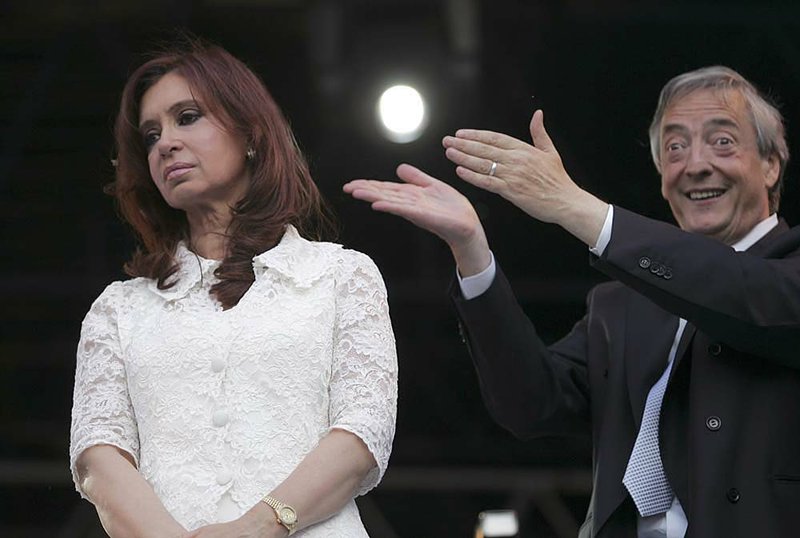BUENOS AIRES, Argentina — Former Argentine President Nestor Kirchner - the country’s most powerful politician along with his wife, current leader Cristina Fernandez - died Wednesday after suffering a heart attack, the presidency said.
Kirchner, 60, died after he was rushed in grave condition to the Formenti de Calafate Hospital while having a severe heart attack, the presidency said.
“It was a sudden death,” his personal doctor, Luis Buonomo, told reporters in El Calafate, where Kirchner and his wife had gone to rest and await their turn to be counted in the nation’s census. Buonomo said an official medical report would be released later in the day.
Kirchner was accompanied at all times by his wife, the presidency said.
Kirchner had undergone an angioplasty after a heart attack in September, but was still a likely candidate in next year’s presidential elections. He also served as secretary-general of the South American alliance known as Unasur, as a congressman and as leader of the Peronist party.
The news shocked Argentines, who by law were staying home Wednesday to be counted. Kirchner’s supporters planned a mass gathering for Wednesday night outside the Casa Rosada, Argentina’s presidential palace. Already, dozens of Argentines showed up in the Plaza de Mayo before the palace, standing silently in mourning.
“There will be a demonstration to honor Kirchner and to show Cristina that we’re with her, supporting her,” said the leader of the Evita Movement, Emilio Persico.
After a ceremony in El Calafate, Kirchner’s body was being flown to Buenos Aires to lie in state in the palace, where a vigil was to begin at noon today.
Kirchner worked hand in hand with his wife to maintain the ruling party’s hold on power. Even more than Fernandez, he was seen as the heir to Argentine strongman Juan Domingo Peron and one of the few people capable of managing Argentina’s unruly and chaotic political scene.
Under Kirchner and his wife, Argentina abandoned the “Washington consensus” of tight fiscal policies and free trade, isolating the country from foreign debt markets and imposing stringent controls on the flow of money and goods in and out of the country.
Kirchner served as president from 2003-2007, bringing Argentina out of a severe economic crisis and encouraging judicial changes that set in motion dozens of human-rights trials involving hundreds of dictatorship-era figures who had previously benefited from an amnesty.
As secretary-general of the Union of South American Republics, or Unasur, Kirchner mediated one of the many border disputes between Venezuela and Colombia. Both countries’ leaders mourned his loss Wednesday.
“Oh my dear Cristina ... how sad! What a huge loss suffered by Argentina and our America! May Kirchner live forever!” Venezuelan President Hugo Chavez tweeted.
Colombian President Juan Manuel Santos asked for a moment of silence in Bogota in Kirchner’s honor.
“It’s a great loss for Argentina and a great loss for the continent,” he said, adding that he would try to reach Fernandez to share his condolences.
U.S. President Barack Obama also praised Kirchner’s significant roles in Argentina and Unasur. “Michelle’s and my thoughts and prayers are with President Fernandez de Kirchner and their children,” he said.
Born in the Patagonian province of Santa Cruz, Kirchner and his wife were active in the Young Peronists party as students in La Plata, where he graduated in 1976. With the military firmly ruling the country, the young couple married and worked as private attorneys in the provincial capital, raising two children - Maximo and Florencia. After democracy returned in 1983, Kirchner entered public service, first as the provincial pensions chief, and then as mayor of Rio Gallegos.
In 1991, he became Santa Cruz’s governor and Fernandez was elected to the provincial legislature, pushing through indefinite re-election and filling the provincial courts with sympathetic judges. In 1995 he was re-elected as governor by an overwhelming margin, laying the groundwork for a jump to politics at the national level.
When the country suffered economic crisis and a world record default in 2001, political unrest and street protests kept a series of presidents from serving out their terms and forced a new election in 2003.
Kirchner, then still a little known provincial governor, was the choice of outgoing President Eduardo Duhalde, but earned just 22 percent of the vote, trailing former President Carlos Menem with 24 percent in the first round. After polls then showed Kirchner winning overwhelmingly in a runoff election, Menem dropped out and Kirchner became president-elect.
During his presidency, Kirchner managed Argentina’s economic recovery, with growth of 8 percent a year, but maintained a frosty relationship with international lenders and forced the holders of Argentina’s bad debt to accept much less than what they had invested for the bonds.
His detractors say the growth resulted from global trends and the combination of depressed salaries and high international prices for the grains that are Argentina’s main exports.
Information for this article was contributed from Buenos Aires by Vicente Panetta, Debora Rey, Mayra Pertossi and Steve Wade and from Bogota, Colombia, by Vivian Sequera of The Associated Press.
Front Section, Pages 6 on 10/28/2010

